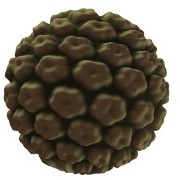 Photo: Getty Images
Photo: Getty Images
A question was posted some months ago on EmpowHER which asked if the human papillomavirus (HPV) went away on its own. Almost six months later, there have been over two hundred responses (and further questions) to this post.
This is obviously an important issue to a significant number of people. I would like to clarify the answer for those who have previously posted and those who continue to respond to this question with concern.
Unfortunately the subject has become very confusing in large part because of the language used by medical professionals, both doctors and nurses, when answering this question for their patients. I have previously commented on my blog that I wish the word “clear” would be eliminated from explanation. The word "clear" only functions to add more ambiguity for the patient.
HPV is a virus which after initial transmission to the newly infected individual, sheds its outer coat revealing the viral DNA which then invades the patient's cells and begins a process of multiplying known as replication. Unlike bacteria which remains outside the cells and can be easily identified by the body’s immune system, the viral DNA essentially hides within the patient’s cells making it difficult for the immune system to recognize and destroy it.
There is no cure for the human papillomavirus neither is there any medication, as there is with the AIDS virus, to prevent replication of the virus. Once becoming infected, the virus will remain in the patient’s body. What does happen, is the immune system will keep the virus under control and at levels unrecognized during testing. Essentially, the virus is deemed dormant.
However, the virus can remain dormant within the cells for weeks, months and even years and under the right conditions, can become active again producing symptoms of a new infection evident by dysplasia (abnormal cell changes) otherwise known as precancerous lesions.
While the majority of infections will regress, becoming asymptomatic within two years, twenty to thirty percent of individuals will continue to have persistent infections which can lead to more severe dysplasia and potentially cancer if untreated.
In summary, HPV is an incurable virus and while it may become dormant for considerable periods of time, it continues to remain within the body. Perhaps if patients received this type of explanation instead of being told that it would clear all by itself, there would be less confusion on the subject.
Sources:
What You Need to Know About HPV. A Common But Potentially Dangerous STD.
About.com. AIDS/HIV. Retrieved August 10, 2011 from http://aids.about.com/cs/conditions/a/hpv.htm
HPV Infection in Men. WebMD. Retrieved August 10, 2011 from http://www.webmd.com/sexual-conditions/hpv-genital-warts/hpv-virus-men?page=2
Human Papillomavirus: HPV Information for Clinicians. CDC - STDs - HPV." Centers for Disease Control and Prevention. Retrieved August 10, 2011 from
http://www.cdc.gov/std/hpv/common-clinicians/ClinicianBro-fp.pdf
Reviewed August 10, 2011
by Michele Blacksberg R.N.
Edited by Jody Smith






Add a Comment2 Comments
I have previously written articles regarding the vaccines available and the differences between Gardasil and Cervarix. While this is certainly a positive step forward, the sad fact remains that within the US only 30% of those beginning the three shot series complete it and so transmission continues as does the potential for dysplasia and cancer. At this rate far more people will continue to become infected than will become protected and more needs to be done for those already infected. The limitations set by the FDA of an outside age of 26 certainly does not help as it excludes an entire segment of the population who may have been in monogomous relationships in their 20s and early 30s only to find themselves divorced and looking to get into a new relationship. Canada has approved the vaccine to age 45 and after three applications to the FDA and having them back burner it twice they have now ruled against extending the age.
August 18, 2011 - 9:37pmThere also continues to be no commercially available test for men and while men may want to know if their partner has HPV where does that leave the woman? Is she not entitled to know if her partner has it as well?
Statistics continue to be misleading as HPV is not a reportable condition as some other STIs are and there are no dysplaisa registry as there are cancer registries to track the number of actual high grade dysplasias occurring in any given year. We all know that the reduction in cervical cancers is the result of early detection and treatment through screening however the lack of this information only functions to falsely lower the numbers when it comes to to levels of high grade lesions being excluded. Those numbers could have tripled and we would not know it without some means to count those cases in the statistics for persistent disease.
Researchers need to focus of a therapeutic vaccine since with the current series completion rate of 30%, new infections will outpace those protected.
This Comment
Bonnie, you have written a very informative article on human papillomavirus and I’m sure it will be very helpful to many concerned women. We all hope that some day more effective treatment for HPV will be available. In the interim, there is good news: infection due to some of the most dangerous types of HPV is preventable with vaccination.
Two HPV vaccines are available. Both protect against the HPV types responsible for 70 percent of all cervical cancers. One vaccine also protects against HPV types that cause genital warts. To prevent infection, the vaccines should be given before HPV exposure. The earliest, and best time to get these vaccines is during adolescence, but women can get vaccinated up to age 26. One of the vaccines is also approved for use in males. For both vaccines, you need three doses over six months for full protection. Because the vaccines don’t protect against every type of HPV infection, women should still have regular Pap screenings.
More information is available at our website: www.Adultvaccination.org. Susan J. Rehm, MD, Medical Director, National Foundation for Infectious Diseases.
August 17, 2011 - 1:36pmThis Comment